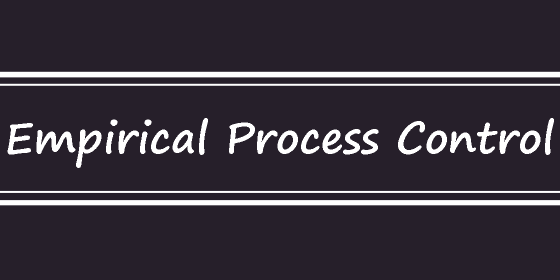Empirical Process Control

Empirical Process Control is a key principle in Agile methodologies and Lean practices. It is an approach to managing and improving processes based on observation, experimentation, and real-time data. The term “empirical” refers to a process of making decisions based on evidence and direct observation rather than relying solely on assumptions or predictions.
Empirical Process Control involves three fundamental steps:
- Transparency: Making the current state of the process visible and transparent to all stakeholders. This includes sharing information, data, and progress openly, enabling everyone to have a clear understanding of the current situation.
- Inspection: Regularly inspecting and evaluating the process and its outputs. This involves collecting data and feedback to assess how the process is performing and whether it aligns with the desired outcomes.
- Adaptation: Based on the insights gained from inspection, making adjustments and adaptations to the process to improve its effectiveness and efficiency. These adaptations are typically made incrementally and iteratively.
The core idea behind Empirical Process Control is that it acknowledges the inherent complexity and unpredictability of many real-world processes. Instead of attempting to predict and control every detail upfront, the focus is on responding to actual observations and data.
In Agile methodologies, Empirical Process Control is embodied through practices like the Scrum framework’s inspect-and-adapt cycles, including Sprint Reviews and Retrospectives. These ceremonies provide opportunities for the team to reflect on their progress, review the completed work, and make improvements for future iterations.
In Lean practices, Empirical Process Control aligns with the continuous improvement principle (Kaizen), where teams actively seek ways to reduce waste and optimize processes based on ongoing observation and feedback.
Key concepts related to Empirical Process Control include:
- Feedback Loops: Continuous feedback loops are established to gather data and insights throughout the process, helping teams make informed decisions.
- Iterative and Incremental Development: The iterative and incremental nature of Agile practices allows for frequent feedback and adaptation.
- Inspect and Adapt: Regularly inspecting the process and adapting based on the insights gained is a fundamental principle in Empirical Process Control.
- Openness and Transparency: Transparency in sharing information and progress ensures that all stakeholders are informed and can contribute to the process.
Empirical Process Control empowers teams to respond quickly and effectively to changing conditions, risks, and uncertainties. It promotes a culture of continuous learning, adaptation, and improvement, enabling organizations to achieve greater efficiency, higher quality outcomes, and increased customer satisfaction.